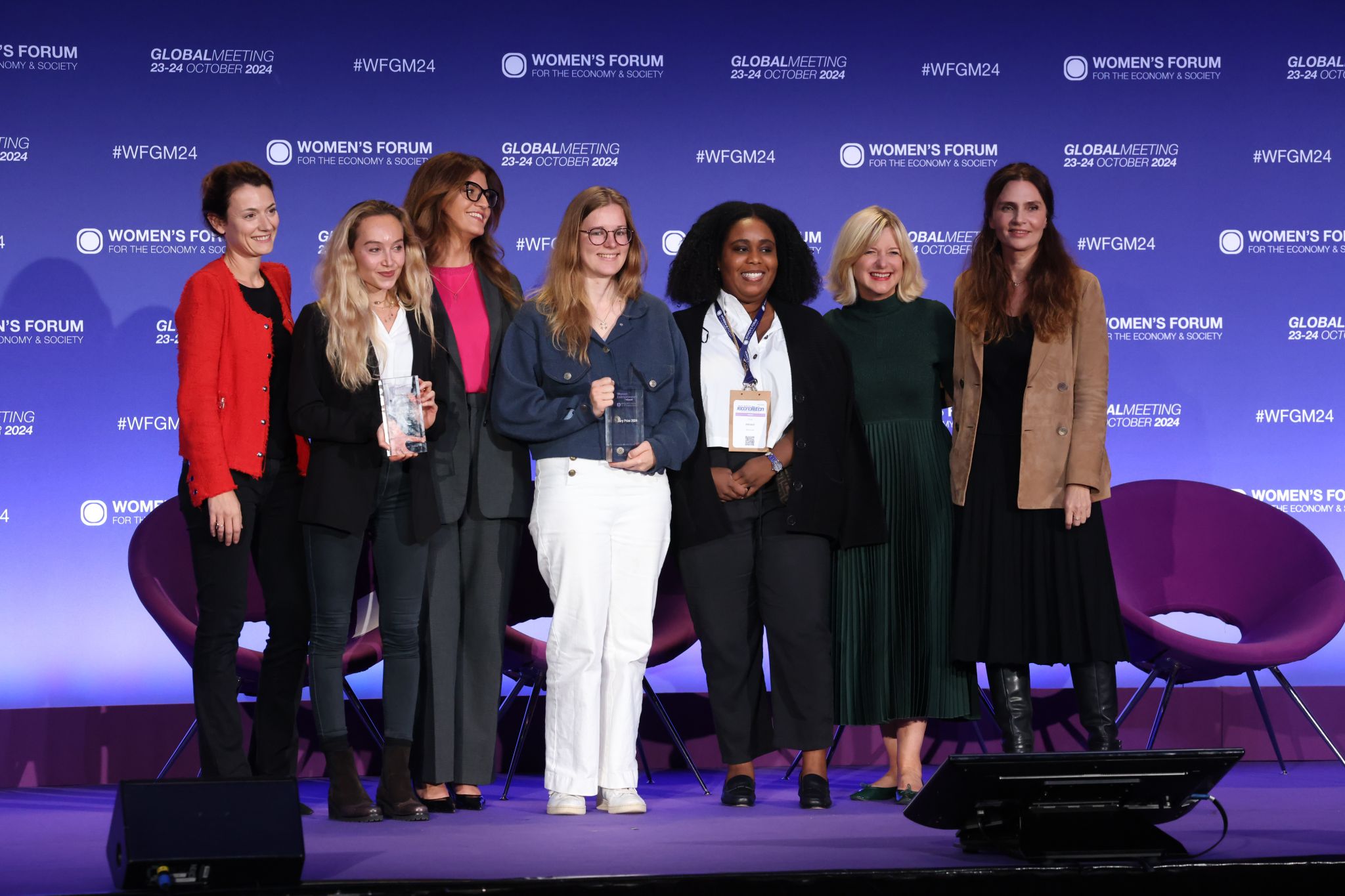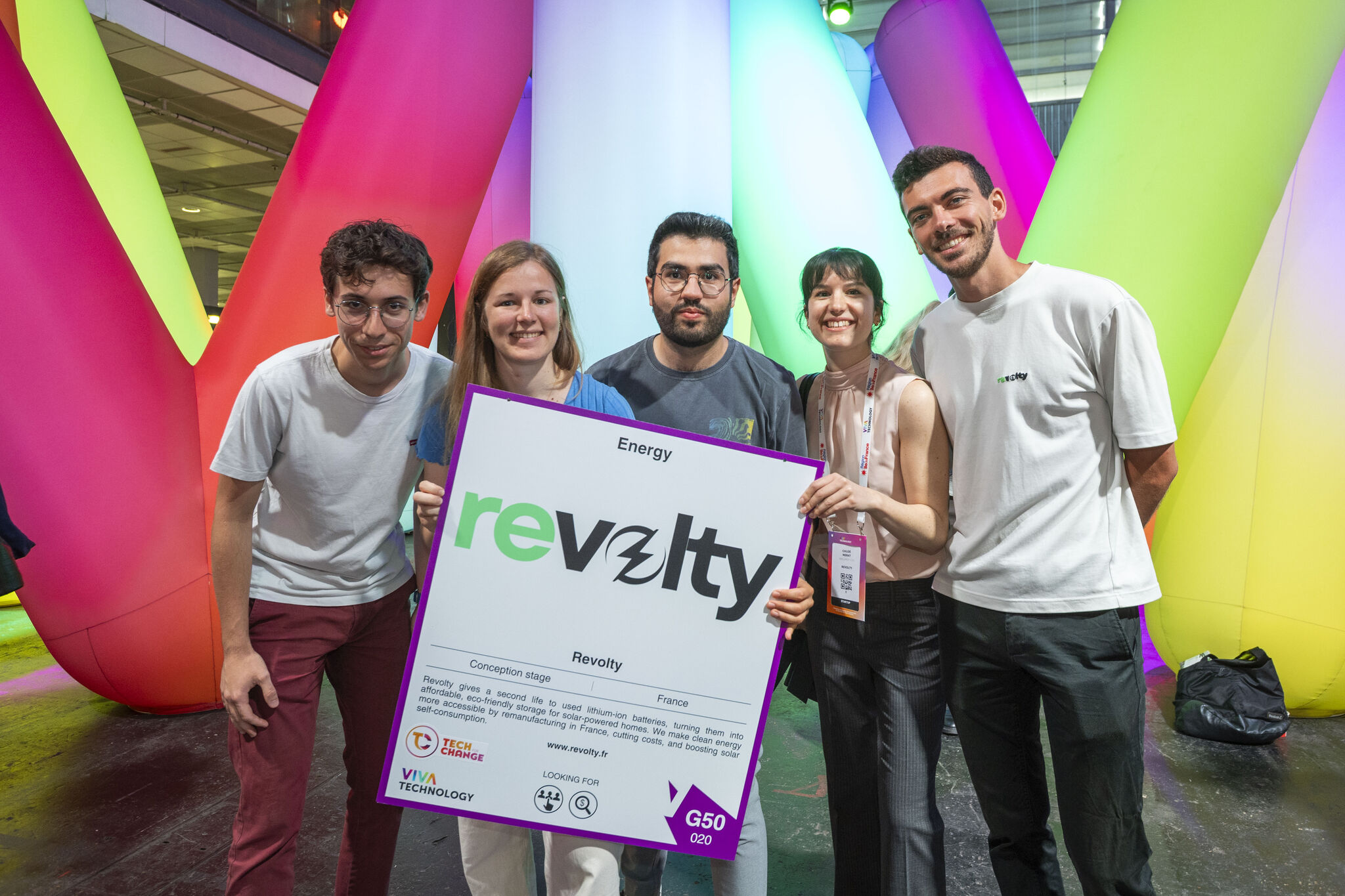Revolty: Reconditioning Batteries for Autonomous Solar Homes
The energy transition concerns us all. In France, over 700,000 households are already equipped with solar panels. But to truly optimize this green energy - and even achieve full energy independence - a few obstacles remain. That’s where Revolty comes in.
This startup, co-founded by Mathilde Janicot, COO of Revolty, and her partner Valentin Heuzé, offers an innovative, eco-friendly, and locally based solution to help households make the most of their renewable energy consumption.

The Challenge of Solar Self-Consumption and the Urgent Need for Storage
More and more French households are installing solar panels as part of a self-consumption approach. The idea is simple: produce your own clean electricity and use it to reduce both your energy bills and your environmental footprint.
However, one key issue remains: solar energy production doesn't always align with household consumption peaks. Mathilde explains: “There’s a gap between production and consumption. Solar panels produce the most electricity around 2 p.m., when the sun is at its strongest, but people aren’t home to use it. Peak consumption usually happens around 6 p.m., when everyone returns from work.” Without a storage solution, up to 60% of a household’s solar energy production can go to waste simply because it isn’t used right away.
Historically in France, surplus solar energy could be sold back to EDF, providing individual producers with a modest income. But in 2025, a major policy shift disrupted this model: the buyback rate offered by EDF plummeted, dropping from 13 euro cents per kilowatt-hour to just 4 cents, a threefold decrease. Meanwhile, the cost of electricity drawn from the grid hovers around 20 cents per kilowatt-hour. This sharp change sends a clear message from the government: the focus is now on encouraging self-consumption and energy storage, rather than simply feeding surplus energy back into the grid.
“We’re really seeing a growing desire for energy independence among individuals, driven by a variety of factors…”
Beyond the economic aspect, this growing drive for energy independence is also fueled by rising energy consumption linked to new uses (heat pumps and electric vehicles) as well as volatile electricity prices and a geopolitical climate that pushes households to protect themselves from market fluctuations and potential shortages.
Battery storage solutions do exist, but they remain relatively uncommon: only 4% of solar-equipped households in France currently use them. Today’s options are often seen as unprofitable, imported from distant markets with questionable traceability, and poorly suited to the specific needs of installers and their customers.
Revolty: Circular Innovation at the Heart of Solar Energy Storage
Faced with these challenges, Revolty offers an innovative solution: giving a second life to used lithium-ion batteries, primarily sourced from electric mobility and industrial storage systems. Rather than sending them directly to recycling (a costly and energy-intensive process) Revolty refurbishes these batteries into solar energy storage systems for individual homes.
Revolty’s value proposition is built on several strong pillars:
- Ecology and circular economy: By reusing existing batteries, Revolty embraces a fully circular approach. This reduces the need to produce new batteries and limits waste.
- Local production: Revolty’s batteries are reconditioned in France, offering a local product with a transparent value chain, in stark contrast to solutions imported from across the globe.
- Affordability and profitability: By working with materials already available, Revolty can offer a more affordable storage solution that may prove more profitable for homeowners than brand-new alternatives.
- Performance: Revolty’s batteries deliver like-new performance thanks to a rigorous selection of second-life modules and a system design that includes long-term advanced diagnostics.
- Localized service: Revolty primarily targets solar panel installers, offering them a local service that includes battery maintenance. This simplifies the offering for installers and ensures a better experience for end customers.
What is Revolty’s business model? The company sells these remanufactured batteries directly to solar installers. In the future, Revolty plans to add services related to flexibility and smart battery management, creating new revenue streams.
As for sourcing used batteries, Revolty is building partnerships across Europe’s battery end-of-life ecosystem. The team works with organizations that collect batteries destined for recycling and are authorized to resell those still in good condition for second-life use. Discussions are also underway with certain battery manufacturers.
How the Idea Was Born with a Helping Hand from HEC Paris
Launched in June 2024, the Revolty adventure truly began at HEC Paris. Mathilde Janicot, an HEC graduate with professional experience at ENGIE and a humanitarian mission in Benin, met Valentin during the X-HEC Entrepreneur Master’s program. Their complementary backgrounds (Mathilde bringing business expertise, and Valentin contributing prior experience with second-life batteries) along with a shared interest in solar energy, quickly led them to join forces.
Revolty was incubated through the HEC Paris Startup Launchpad program. This intensive phase of market and customer exploration, involving numerous conversations with both individuals and industry professionals, helped confirm a clear unmet need: effective and affordable energy storage solutions. It was during this time that Valentin introduced the technical possibility of reusing existing batteries, an idea that aligned perfectly with the challenges they had identified.
Overcoming the Challenges of a Circular Hardware Project
Launching a startup is never without its hurdles, and Revolty is no exception. Mathilde Janicot points to several challenges, starting with the courage it takes to dive into entrepreneurship. It wasn’t necessarily a path she had envisioned, but the X-HEC Entrepreneur Master’s program provided a structured environment that helped reduce the risks and build the right support network.
The other, and perhaps greater, challenge lies in the very nature of the project itself: a hardware startup operating in the circular economy, with a strong technical focus on batteries. This brings longer development timelines, scalability constraints, and complex processes involving hardware procurement, assembly, and prototyping. Mathilde describes daily life as a constant learning curve in the world of hardware. The current stage, setting up a workshop to literally "get their hands dirty", is a perfect reflection of this reality.
She even shares an anecdote that captures the "DIY" spirit of this prototyping phase: “We found our first beta tester through a Facebook group, a battery DIY enthusiast who let us install our very first prototype batteries in his home.” This unlikely encounter proved invaluable for learning and moving forward.
Lastly, the departure of their co-founder, Julen, also marked a moment of transition for the team. “The separation went smoothly, but it definitely took extra effort to find our rhythm again as a team of two, while also searching for a new teammate, who has since joined us,” explains Mathilde.
The HEC Paris Ecosystem: The Driving Force Behind the Revolty Journey
If there’s a common thread running through Revolty’s journey, it’s HEC Paris. The startup has grown in step with Mathilde’s path through the business school’s entrepreneurial ecosystem. After completing the X-HEC Entrepreneur Master’s program and participating in the Startup Launchpad (both of which laid the foundation for the project), Mathilde joined the WomenEntrepreneurs4Good program. This, in turn, helped facilitate Revolty’s entry into the HEC Paris incubator at Station F.
Each stage brought specific benefits:
- The X-HEC Entrepreneur Master’s program was a year of intense learning, key encounters (including meeting Valentin), and a deep dive into the world of entrepreneurship.
- The Startup Launchpad gave Revolty its initial momentum by structuring the early steps, from market exploration to pitch development.
- The WomenEntrepreneurs4Good program offered increased visibility, access to the HEC Paris incubator, and inspiring connections with other women entrepreneurs.
- The HEC Paris Incubator at Station F marks the current acceleration phase. It provides a dynamic physical workspace, surrounded by fellow entrepreneurs, along with valuable support from staff and mentors. This experience helps the team challenge Revolty’s strategy and tackle real-world issues, such as finalizing complex contracts.
Participation in events like the X-HEC Entrepreneurs Demo Day (where the team won the audience award), the Pitch Competition at the Women’s Forum (where Mathilde won the jury prize), and Vivatech has also been pivotal in boosting Revolty’s visibility, even leading to their first investor meeting. Mathilde expresses her appreciation for HEC’s support:
“The ecosystem provides structure, guidance, and an invaluable network, all while allowing the freedom to chart your own course, which is especially important for a project as unique as ours."
Early Success and Future Outlook
Mathilde is proud to share that just a few weeks ago, Revolty installed its very first battery at the home of the beta tester they connected with via Facebook. The feedback from this initial test has been extremely positive: the system is working well, surplus energy is being stored efficiently, and the household has achieved near-complete independence from the electrical grid thanks to the solution.
This test also marks a major turning point internally. “We were able to test different components and make a big leap toward designing the final prototype,” Mathilde says enthusiastically.
The next steps for Revolty are clear and ambitious: accelerate the battery’s development and secure CE certification, a prerequisite for commercialization in Europe. To achieve this, the team plans to set up its own workshop and expand its technical team, aiming to launch the first battery on the market by 2026.
To finance this intensive development phase and the creation of the workshop, Revolty is currently preparing a fundraising round and plans to recruit additional technical talent ahead of the 2026 launch.
Revolty’s Latest Awards and Recognitions:
🏆 1st Prize - HEC Changemaker Pitch Contest at ChangeNOW 2025
🏆 TOP 30 - Female Founder Challenge 2025 by VivaTech
🏆 Tech For Change Award – VivaTech
✨ Finalist - Petit Poucet Competition 2025
✨ Finalist - SPRING50 (GreenTech Category)

